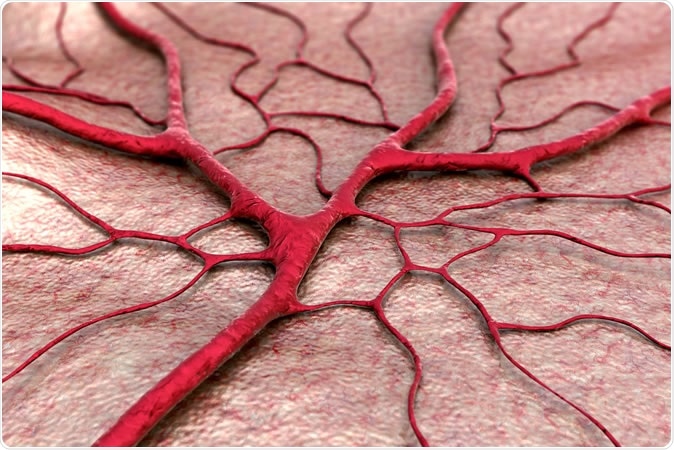A new study shows that blood vessels, including large and small arteries, in women, age much faster in women than in men. This is the first time this finding has been reported. The study, published in the journal JAMA Cardiology in January 2020, will be helpful in showing how women are at a different risk for cardiovascular disease, both with respect to the type and the timing, than men.
Prevailing wisdom seems to be that women and men are at the same type of risk, and that the only difference is that men develop disease earlier. By midlife, so it goes, women will have the same extent of disease as men do. However, says researcher Susan Cheng, “Our research not only confirms that women have different biology and physiology than their male counterparts, but also illustrates why it is that women may be more susceptible to developing certain types of cardiovascular disease and at different points in life."

Blood vessels - illustration. Image Credit: UGREEN 3S / Shutterstock
The study
The current study was based on the need to find out how serial blood pressure measurements vary between men and women over a long period of time, from the measurement at baseline.
The researchers looked at data from different communities gathered from several sites across the country. This included the blood pressure measurements for males and females which were separately analyzed, since it is an important indicator of the risk for cardiovascular disease. They had almost 145,000 readings from over 43 years, taken serially in the same set of almost 33,000 patients. The age of these participants varied from 5 to 98 years.
The measures which they looked for include age, systolic blood pressure, diastolic blood pressure, mean arterial pressure, and pulse pressure.
The risk of heart attack, heart failure or stroke is typically based on the presence of high blood pressure. Based on this premise, the researchers analyzed this data looking for any patterns which would indicate the start of a rise in blood pressure, and any underlying causes. They also compared groups of women with different characteristics with each other, and groups of men with each other, rather than going the traditional route of comparing observations in men with those made in women.
The findings
This sex-specific analysis shows clearly that blood vessels function quite differently in men compared to women, both at the start and later in life. These changes begin by as early as the third decade of life and continue to be observed as the woman grows older. They lay the foundation of heart and vascular diseases that look quite different in women compared to men.
The scientists found, for example, that blood pressure rises much earlier in women than in men. The blood pressure rises in women also showed a much steeper slope than in men. To put this in perspective, hypertension will probably worsen much faster in women than in men. Explains Cheng, “This means that if we define the hypertension threshold the exact same way, a 30-year old woman with high blood pressure is probably at higher risk for cardiovascular disease than a man with high blood pressure at the same age.” Not only do the blood vessel changes occur earlier but the rate at which they increase is also more rapid in women.
Implications
The real point of this study may be the discovery of distinct variations in the pattern of hypertension in men and women, but it also highlights the need to involve more women in research, and to look for sex-related differences in the way the heart and vascular system operate in both health and disease, according to co-researcher Christine Albert. She says it should be of great help in redirecting researchers and physicians to look at women and their cardiovascular status in a different light. Summing up, she comments: “This study is yet another reminder to physicians that many aspects of our cardiovascular evaluation and therapy need to be tailored specifically for women. Results from studies performed in men may not be directly extrapolated to women.”
Journal reference:
Ji H, Kim A, Ebinger JE, et al. Sex Differences in Blood Pressure Trajectories Over the Life Course. JAMA Cardiol. Published online January 15, 2020. doi:10.1001/jamacardio.2019.5306, https://jamanetwork.com/journals/jamacardiology/article-abstract/2758868